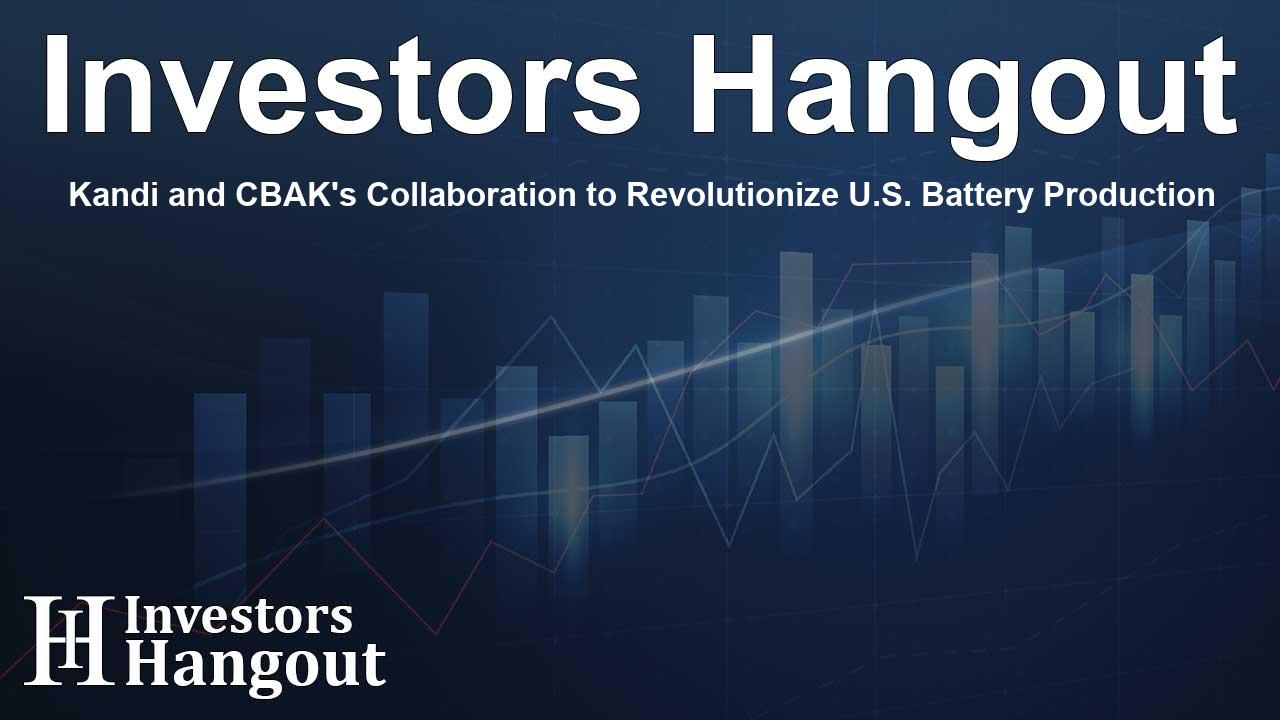Kandi and CBAK's Collaboration to Revolutionize U.S. Battery Production

Strategic Collaboration for Battery Production
This partnership sets the stage for the establishment of two advanced lithium battery production facilities in the U.S. aimed at meeting the surging demand in the off-road vehicle market while supporting clean energy initiatives under U.S. policies.
Overview of the Partnership
Kandi Technologies Group, Inc. (NASDAQ: KNDI) and CBAK Energy Technology, Inc. (NASDAQ: CBAT) have launched a strategic partnership dedicated to advancing battery production capabilities in North America. With the ever-increasing demand for batteries in off-road vehicles and energy storage, this collaboration positions both companies to capitalize on this blooming market.
The locations for these facilities are still under evaluation but are expected to provide significant local production capabilities. The first facility will focus on the assembly of battery packs, whereas the second will be concentrated on the manufacturing of battery cells, allowing a phased approach to development.
Key Highlights of the Facilities
Complementary Manufacturing Focus
The joint venture outlines a clear division of responsibilities, with CBAK leading the cell manufacturing plant while retaining 90% equity. Conversely, Kandi will head the pack assembly facility and also maintain 90% equity. This structure allows both companies to leverage their strengths effectively.
Market Potential and Opportunities
The North American market for off-road vehicles, including UTVs and golf carts, was valued at an impressive $16.7 billion and is projected to surge to approximately $25 billion by the close of the decade. The foresight of this partnership is positioned to serve a substantial portion of this expanding market's battery requirements.
Building an Integrated Supply Chain
Kandi and CBAK are intent on developing high-energy-density battery systems specifically designed for off-road and recreational vehicles. To streamline the production process at Kandi’s battery pack facility, CBAK will provide battery cells at competitive market rates initially sourcing from overseas production until its U.S.-based facility becomes fully operational. This model promises to create a robust, end-to-end supply chain.
Leadership Perspectives
Feng Chen, the CEO of Kandi Technologies, expressed enthusiasm about the partnership, emphasizing its pivotal role in their North American strategy. Chen remarked, “By establishing local production capabilities for both battery cells and packs, we’re enhancing supply chain agility and aligning with clean energy incentives set by the U.S. government. This positions us effectively to satisfy the growing demand in the off-road and recreational vehicle market.”
Similarly, Zhiguang Hu, CEO of CBAK, reflected on the partnership's significance, stating, “Our collaboration with Kandi highlights our unified vision to globalize advanced battery manufacturing while aligning closely with the dynamic U.S. market. Our expertise in lithium cell production will be paramount in providing a dependable local supply for emerging vehicle platforms.”
Final Considerations
While the definitive agreements are still being finalized, the specifics regarding project locations and timelines may experience adjustments. Stakeholders are encouraged to stay tuned for updates from both companies for more precise information.
About the Companies Involved
Kandi Technologies Group, Inc. (KNDI) is at the forefront of new energy innovation, facilitating research, development, and manufacturing of various vehicle products. Headquartered in Zhejiang Province, Kandi operates through several subsidiaries, establishing itself as a prominent manufacturer of electric vehicle components and off-road vehicles.
CBAK Energy Technology, Inc. (NASDAQ: CBAT) stands as a key player in the high-tech arena, specializing in the development and manufacture of high-power lithium batteries. As a pioneer, CBAK became the first lithium battery manufacturer in China listed on the Nasdaq and continues to innovate in the electric vehicle and storage markets.
Frequently Asked Questions
What is the purpose of the partnership between Kandi and CBAK?
The partnership aims to establish lithium battery production facilities in the U.S. to meet growing demand in the off-road vehicle sector.
What types of facilities will be developed?
Two facilities will be established: one for battery pack assembly and another for battery cell manufacturing.
What market are Kandi and CBAK targeting?
They are focusing on the North American market for off-road vehicles, which is projected to grow significantly.
How will this partnership affect supply chain resilience?
The collaboration enhances supply chain agility and resilience by localizing production and ensuring a steady supply of battery components.
What are the expected benefits of this partnership?
The partnership is set to unlock long-term growth potential by capturing market share and aligning with clean energy policies.
About The Author
Contact Thomas Cooper privately here. Or send an email with ATTN: Thomas Cooper as the subject to contact@investorshangout.com.
About Investors Hangout
Investors Hangout is a leading online stock forum for financial discussion and learning, offering a wide range of free tools and resources. It draws in traders of all levels, who exchange market knowledge, investigate trading tactics, and keep an eye on industry developments in real time. Featuring financial articles, stock message boards, quotes, charts, company profiles, and live news updates. Through cooperative learning and a wealth of informational resources, it helps users from novices creating their first portfolios to experts honing their techniques. Join Investors Hangout today: https://investorshangout.com/
The content of this article is based on factual, publicly available information and does not represent legal, financial, or investment advice. Investors Hangout does not offer financial advice, and the author is not a licensed financial advisor. Consult a qualified advisor before making any financial or investment decisions based on this article. This article should not be considered advice to purchase, sell, or hold any securities or other investments. If any of the material provided here is inaccurate, please contact us for corrections.
